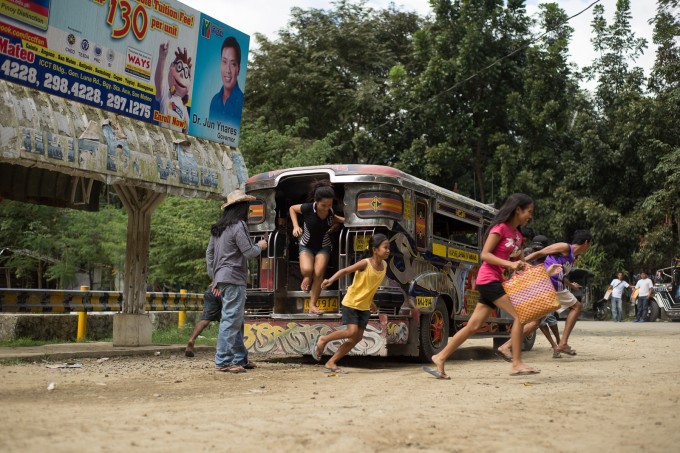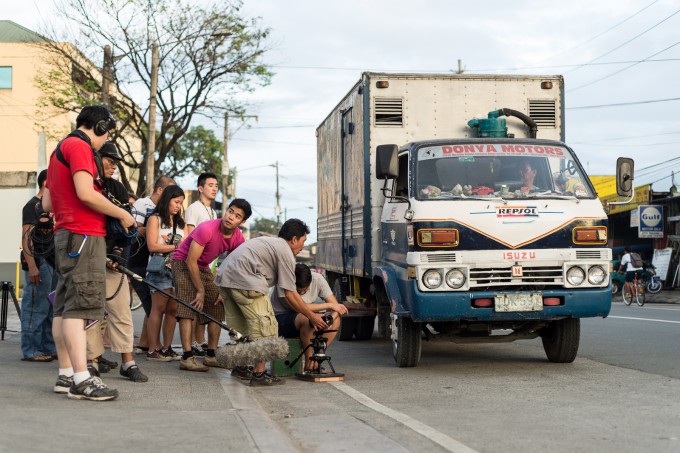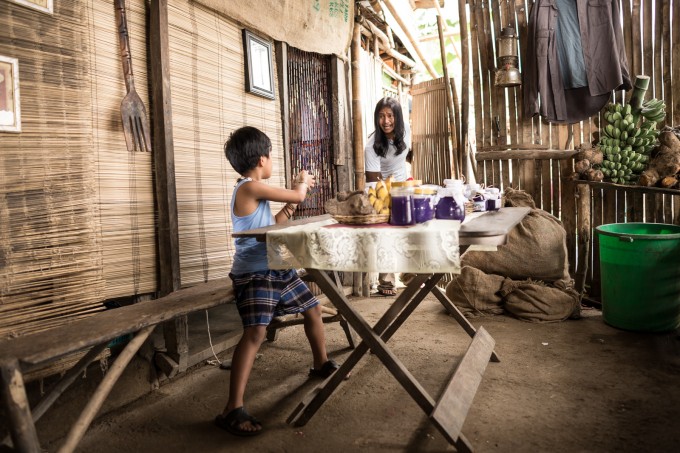AAIFF’12 alum Paolo Bitanga gave us some insights on his latest project MANG ABE’S UBE. Read our interview with him below!
CineVue: As an AAIFF’12 alum, what is your fondest memory of being at the festival?
Paolo Bitanga: My fondest memory of being at the festival was opening night; I thought it was fantastic for as a kick-off for the entire festival. It was packed and I went to the screening of SHANGHAI CALLING – a full house. The film was a great start for the festival, it was great seeing the directors and some of the actors I got to meet them afterwards, a great reception afterwards with good food. I got to meet with a lot of fellow filmmakers and network. Yes, opening night!
CV: Tell us a little bit about the influence of children in MANG ABE’S UBE.
PB: With most of my films, I celebrate creativity, especially among the youth. Especially with my film COMRADES (AAIFF’12). It was a children’s film. I think about MANG ABE’S UBE, as a family film I guess. We also emphasize on the one child character. I guess in my work, a recurring theme is empowering children through creativity, because I am very sentimental about my past, my roots, as a creative person when I was younger. I was engaged in all forms of art, I was into acting, drawing, public speaking, and then I eventually started dancing. But what was constant, was the storytelling part – I make sure to focus on story with everything I do.

CV: What made you decide to shoot in the Philipines, and what are your connections there?
PB: Well I’ve always wanted to shoot back home. You know most of my creative talent was fostered in that environment and I wanted to pay tribute to it and do my biggest production yet over there. And one thing that I noticed growing up, I’ve been to a lot of countries around the world – various continents, and I realized that the Philippines is really the most, one of the most colorful countries in the world. And I don’t think a lot of people see that. I don’t think a lot of people know that. So I want to really bring that out. I think the problem is that there is a tint of pollution that coats the vibrant surfaces of the Philippines’ backdrop and I wanted the colors to pop out beyond that. I want to show the world really just how vibrant the look of the Philippines is and celebrate the cultural diversity through that image and that as ethic.

CV: Who worked on the project with you and how did you assemble your team?
PB: Since it was an international co-production, a hybrid of American filmmakers and Filipino filmmakers coming together. And so on the American side you got my colleagues here who’ve I been making films with for three years now, and so we had Chris Zou as assistant director, Dennis Hu who is 1st sound mixing, my producer Kayla Wong, Roland Lazarte my director of photography, I worked with them on some of my best projects. And for team Philippines, we locally outsourced some of the independent cinema’s great talents – my line producer is Armi Cacanindin, and she worked on AMIGO which was also at the Asian American International Film festival, and Toronto International Film Festival, she was also apart of GRACELAND, which did massively well at Tribeca last year, it got runners up for audience awards. It’s coming out by the end of the month , so you can actually watch it in theaters, you can see the Philippines in theaters here. My production designer is Jeck Cogama, and he is fantastic. He is one of the best production designers in Philippines’ independent cinema. He was worked on some of the greatest films that have come out of the Philippines, and gone to international film festivals. SO I was blessed to be working with both of them and they helped recruit the rest of the team. We averaged about 50 people on set a day; we had a lot of hands working on this film its what I like to call a “short but big production.”
And as for my cast, I worked with professional actors, really great all from the Philippines. We had Leon Miguel, who played the villain in GRACELAND, but he’s playing the main character in MANG ABE’S UBE, and Leon Miguel was also in the film METRO MANILA, which won audience award at this year’s Sundance. The funny thing about Leon Miguel is that he seems to have more international fans than Filipino fans because the independent cinema in the Philippines isn’t celebrated too much there, and is known more abroad.
And our child actor Micko Laurente, playing his son in the film, is an up and coming. He had his cinematic debut a month before we shot he was in a film at the metro manila film festival back home and some of the great reviews of the film was on his acting saying that this 7 year old child actor is going to be the next big thing. So we got him at the right time, right after he got his big break and he was amazing to work with, such acute kid – he turned 8 on the first day of shooting and we also had Bong Cabrera who plays the storyteller in the film. He’s not in the film as much as the two characters but it was great working with him. It was a great cast.

CV: What is the most challenging thing when producing the film?
PB: The challenge in producing the film was the long distance relationship, because I had to email back and forth, we had the time zone differences, – I wouldn’t get e-mails from them for weeks really. I was working with professionals and they were working on different sets and they were on huge features, working with the best Filipino directors and they didn’t have that much time to think about my short film until the few weeks before production and what else made it difficult was the difference between the Philippines and American dynamic because to make movies in America, things needs to be set, they have to be scheduled perfectly, they have to be pre-planned pre-conceived, which is the same thing for the Philippines except they do things a little more last minute for lack of a better term. So really those 2 weeks leading to production were all planning everyday non-stop because the months before they were quite meager and so we had to get used to that. We had to get used to the unpredictability, it was quite nerve-wracking – like are we really making this film, is it really going to happen when we get to the Philippines, are they really going to be prepared? And they were amazing it was great working there and I’ve already written my next feature to be shot there and hopefully it’ll get produced
CV: What do you hope to do with the film?
PB: This is my calling card film. I put my heart and soul into this. From my college experience, everything I learned in college is just put into this one product and I’m using it to pitch myself as a director – hopefully it’ll get seen by some great audiences, and I’m planning to send it to the biggest film festivals in the world like Cannes in France, Toronto, Sundance, Tribeca, and everywhere else, AAIFF and other Asian Film Festivals. Not looking for profit, but just to get my name out hopefully someone see some talent there and they’d like to endorse me on my feature.
CV: What are some of your aspirations as a filmmaker?
PB: They’re very typical, predictable but I’m going for it. I want to make a name for myself as a feature film director. I want to make big movies here in America and I want to do it in the name of Philippines cinema and I really want to help out my country, help inspire people and help get people to succeed because I work for my friends, family, I want all of us to move up together, and I always makes sure to keep in touch with everyone and help out when I can. I’ll make it big here in America and help my hometown along in the process.
CV: Any last words to CineVue audience?
PB: We’re looking to raise funds. We have the indiegogo campaign up, we’re looking to raise (money) as much as we can, because like I said it was a short but big production. And I think it’s worth being a part of and I think it’s kind of rare that you see just so much being put into a short film. Its amazing – the talent my fellow crew members. I was just inspired. I’ve never experience my own passion being matched and raised by other people fueling their own creativity, their own passion to it and just magnifying it to bigger scale it’s very touching and I hope this just continues and hopefully people will enjoy the film and people would like to see me make more films.
Help fund the film here: http://www.indiegogo.com/projects/mang-abe-s-ube?c=home
 Originally from the Philippines, Paolo has crafted numerous works throughout his time at New York University’s film program such as Pinoy B-boy, a feature-length documentary about Filipino breakdancers. He co-founded Mochi Productions, a New York-based collective of filmmakers that produces online video content including their original webseries, Sun and The Art of Dating. His films have screened at acclaimed festivals Doc NYC, Newport Beach Film Festival, and the Asian American International Film Festival.
Originally from the Philippines, Paolo has crafted numerous works throughout his time at New York University’s film program such as Pinoy B-boy, a feature-length documentary about Filipino breakdancers. He co-founded Mochi Productions, a New York-based collective of filmmakers that produces online video content including their original webseries, Sun and The Art of Dating. His films have screened at acclaimed festivals Doc NYC, Newport Beach Film Festival, and the Asian American International Film Festival.

